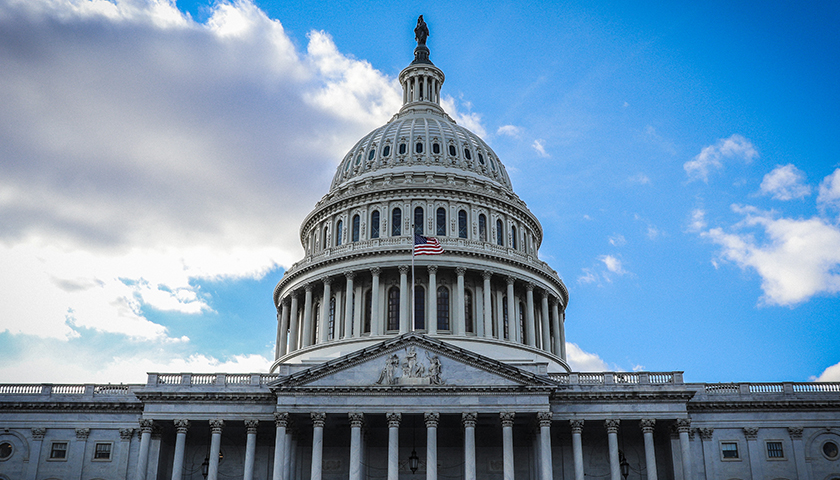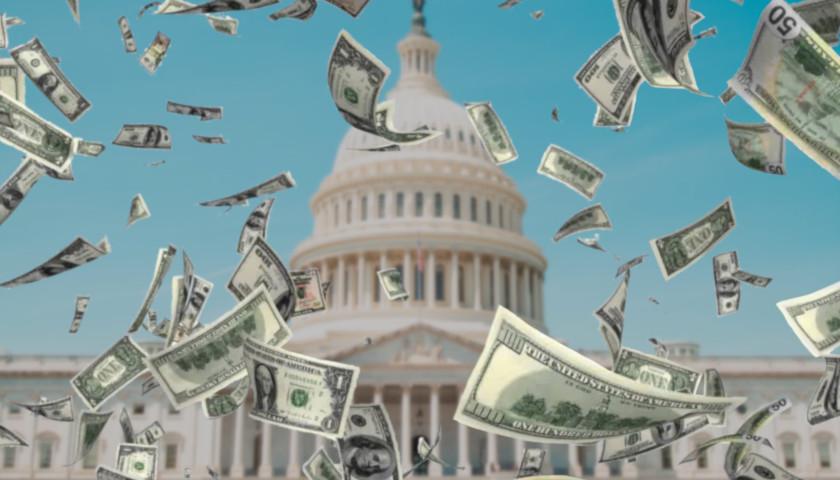by Casey Harper
One of the nation’s leading economic and business groups is warning that the $3.5 trillion spending bill before Congress is an “existential threat” to the nation’s economy.
The U.S. Chamber of Commerce has launched a six-figure television ad campaign targeting the proposed tax hikesin the measure that would be “taking more hard-earned money from small businesses and working families.”
The initial ads will play in California, Minnesota, Virginia, New York and Iowa.
“This reconciliation bill is effectively 100 bills in one representing every big government idea that’s never been able to pass in Congress,” U.S. Chamber of Commerce President and CEO Suzanne Clark said. “The bill is an existential threat to America’s fragile economic recovery and future prosperity. We will not find durable or practical solutions in one massive bill that is equivalent to more than twice the combined budgets of all 50 states. The success of the bipartisan infrastructure negotiations provides a much better model for how Congress should proceed in addressing America’s problems.”
The chamber also sent a letter to the House of Representatives last week warning members to not support the legislation.
“This ‘everything but the kitchen sink’ approach to raising taxes and creating new government spending and regulatory programs is an existential threat to America’s fragile economic recovery and future prosperity, and will hamstring America as we work to compete globally, especially with China,” the letter said. “No member of Congress can achieve the support of the business community if they vote to pass this bill as currently constructed.”
But some lawmakers are threatening to sabotage a bipartisan infrastructure bill if the $3.5 trillion spending plan doesn’t pass. On Wednesday, 11 Democratic senators said they would kill the $1 trillion infrastructure bill without passage of the $3.5 trillion measure.
The senators, who released a joint statement, include Sens. Cory Booker, D-N.J., Kirsten Gillibrand D-N.Y., Mazie K. Hirono, D-Hawaii, Ed Markey, D-Mass., Jeff Merkley, D-Ore., Alex Padilla, D-Calif., Bernie Sanders, I-Vt., Brian Schatz, D-Hawaii, Tina Smith, D-Minn., Elizabeth Warren, D-Mass., and Sheldon Whitehouse, D-R.I.
“We voted for the bipartisan infrastructure bill with the clear commitment that the two pieces of the package would move together along a dual track,” the senators said in the joint statement. “Abandoning the $3.5 trillion Build Back Better Act and passing the infrastructure bill first would be in violation of that agreement. Congress must not undercut the President’s proposals that will create new opportunities for America’s families and workers. The House of Representatives should wait to pass the bipartisan infrastructure bill until the budget reconciliation bill, which enacts the rest of the President’s Build Back Better agenda, is sent to the President’s desk.
“We strongly support the Congressional Progressive Caucus and other members in the House who have said they intend to vote for the bipartisan infrastructure bill only once the Build Back Better Act is passed,” they added. “That is what we agreed to, it’s what the American people want, and it’s the only path forward for this Congress.”
This stance complicates things for Democratic leadership, especially after multiple Democratic senators have said they cannot support the larger bill because of its hefty price tag. Sen. Joe Manchin, D-W.V., and Sen. Kyrsten Sinema, D-Ariz., have both balked at voting for the $3.5 trillion bill.
“These are not indications of an economy that requires trillions in additional spending,” Manchin said. “Every elected leader is chosen to make difficult decisions. Adding trillions of dollars more to nearly $29 trillion of national debt, without any consideration of the negative effects on our children and grandchildren, is one of those decisions that has become far too easy in Washington. Given the current state of the economic recovery, it is simply irresponsible to continue spending at levels more suited to respond to a Great Depression or Great Recession – not an economy that is on the verge of overheating.”
– – –
Casey Harper is a Senior Reporter for the Washington, D.C. Bureau for The Center Square. He previously worked for The Daily Caller, The Hill, and Sinclair Broadcast Group. A graduate of Hillsdale College, Casey’s work has also appeared in Fox News, Fox Business, and USA Today.





